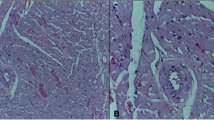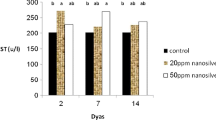Abstract
Pollution of the environment by petroleum products is a common feature in oil producing nations, especially in the developing countries where the incidence of pipe line leakage and valdalization is very common. This study investigated the effects of exposure to water contaminated with very low concentration of diesel on some hematological and serum biochemical parameters of mice. A total of 20 albino mice were used for the study. The mice were allowed to drink from water contaminated with diesel 1 %, v/v for 6 weeks. Hematological and serum biochemical parameters of the mice that were exposed to the contaminated water were compared to control mice. There was a significant (p<0.05) decrease in the packed cell volume, hemoglobin concentration, red blood cell count, mean corpuscular hemoglobin, and mean corpuscular hemoglobin concentration of mice that were allowed to drink from the diesel-contaminated water. The mean corpuscular volume also increased significantly (p<0.05) in these mice. The activities of these serum enzymes; aspartate aminotransferase, alanine aminotransferase, and alkaline phosphatase increased significantly (p<0.05). Serum concentrations of total bilirubin and creatinine also increased significantly (p<0.05). The results indicate that diesel-contaminated water or products even at the lowest concentration is a threat to the environment. The health of humans and other species exposed to this environmental pollutant is adversely affected.
Similar content being viewed by others
References
Alkindi AYA, Brown JA, Waring CP, Collins JE (1996) Endocrine, osmoregulatory, respiratory and hematological parameters in flounder exposed to water soluble fraction of crude oil. J Fish Biol 49:1291–1305
Bessey OA, Lowry OH, Brock MJ (1964) Colorimetric method for determination of alkaline phosphatase. Biol Chem 37:321–324
Blass KG, Thiebert RJ, Lam LK (1974) A study of the mechanism of the Jaffe reaction. J Clin Chem Clin Biochem 12:336–343
Boyd BA (1983) Clinical enzymology. In: Kaneko JJ, Harvey JW, Bruss ML (eds) Clinical biochemistry of domestic animals, 5th edn. Academic, London, pp 285–302
Briggs KT, Yoshida SH, Gershwin ME (1996) The influence of petrochemicals and stress on the immune system of seabirds. Regul Toxicol Pharmacol 23:145–155
Calabrese EJ (1985) Volatilisation of chloroform from water during the showering process. Paper presented in the University of Pittsburgh Conference on non-ingested exposure to drinking water, pp. 48–57
Chiu D, Vinchinsky E, Klema K, Lubin B (1982) Peroxidation, vitamin E and sickle cell anaemia. In: Lubin B (eds.), Vitamin E: biochemical, haematological and clinical aspects. Annals of New York Academy of Sciences 393:323–335
Coles EH (1986) Erythrocytes, leukocytes and bone marrow. In: Coles EH (ed) Veterinary clinical pathlology, 4th edn. W.B. Saunders Co, Philadelphia, pp 10–97
Connell DW, Miller GJ (1981) Petroleum hydrocarbons in aquatic ecosystem, behaviour and effects of sublethal concentrations. Part 1. Crit Rev Environ Control 11:37–104
Coon NC, Dieter MC (1981) Responses of adult mallard ducks to ingested South Louisiana crude oil. Environ Res 24:309–314
Doumas BT, Perry BW, Sasse EA, Straunffor JV Jr (1973) Standardization in bilirubin assays: evaluation of selected methods and stability of bilirubin solutions. Clin Chem 19:984–993
Depledge MH (1995) The rational basis for the use of biomarkers as ecotoxicological tools. In: Fossi MC, Lleonzio C (eds) Non-destructive biomarkers in higher vertebrates. Lewis Boca Raton, Florida, pp 162–190
Leighton FA, Lee YZ, Rahimtula AD, O’brien PJ, Peakall DB (1985) Biochemical and functional disturbances in red blood cells of herring gulls ingesting Prudhoe bay crude oil. Toxicol Appl Pharmacol 81:25–31
Meyer DJ, Harvey JW (1998) Veterinary laboratory medicine and diagnosis. W.B. Saunders Company, Philadelphia
Newman SH, Anderson DW, Ziccardi MH, Trupkiewiez JG, Tseng FS, Christopher MM, Zinkl JG (2000) An experimental soft release of oil spill-rehabilitated American coots (Fulica americana) II: effects on health and blood parameters. Environ Pollution 107:295–304
Okpokwasili GC, Odokuma C (1994) Tolerance of Nitrobacter to toxicity of some Nigerian crude oil. Bull Environ Contam Toxicol 32:388–395
Onwurah INE (1998) Biochemical oxygen demand exertion and glucose uptake kinetics of Azotobacter in crude oil polluted medium. Bull Environ Contam Toxicol 60(3):464–471
Prat PW (1985) Laboratory procedure for animal health technicians, 1st edn. American Veterinary Publication Inc, California, pp 39–60
Reitman S, Frankel S (1957) Reitman and Frankel’s colorimetric methods for estimating SGOT and SGPT. Am J Clin Pathol 28:56–63
Saneky RK, Hoffmann WE, Hansan R, Schaeffer DJ (1993) Quantification of boe ALP in canine serum. Vet Clinical Pathology 22:17–23
Schalm OW, Jain NC, Carroll EJ (1975) Veterinary hematology, 3rd edn. Lea and Febiger, Philadelphia 45
Steel RG, Torrie HH (1980) Principles and procedures of statistics, 2nd edn. McGraw Hill Inc., New York, p 87
Tahir A, Fletcher TC, Houlifan DF, Secombes CJ (1993) Effects of short term exposure to oil contaminated sediments on the immune response of dab (Limanda limand). Aquatic Toxicol 27:71–82
Torgov VG, Tatarchuck VV, Druzhinina IA, Korda TM (1994) Atomic Energy 76(6):442–448
Whitby LG, Percy-Robb LW, Smith AF (1984) Lecture notes on clinical chemistry, 3rd edn. Blackwell Scientific Publication, NY, pp 158–159
Yamato O, Goto I, Meye Y (1996) Hemolytic anemia in wild sea duck caused by marine oil pollution. J Wildl dis 32:381–384
Author information
Authors and Affiliations
Corresponding author
Rights and permissions
About this article
Cite this article
Udem, S.C., Lekwuwa, I.A.M. & Udem, N.D. Effects of drinking diesel-contaminated water on the hematological and serum biochemical parameters of mice. Comp Clin Pathol 20, 19–23 (2011). https://doi.org/10.1007/s00580-009-0945-1
Received:
Accepted:
Published:
Issue Date:
DOI: https://doi.org/10.1007/s00580-009-0945-1




